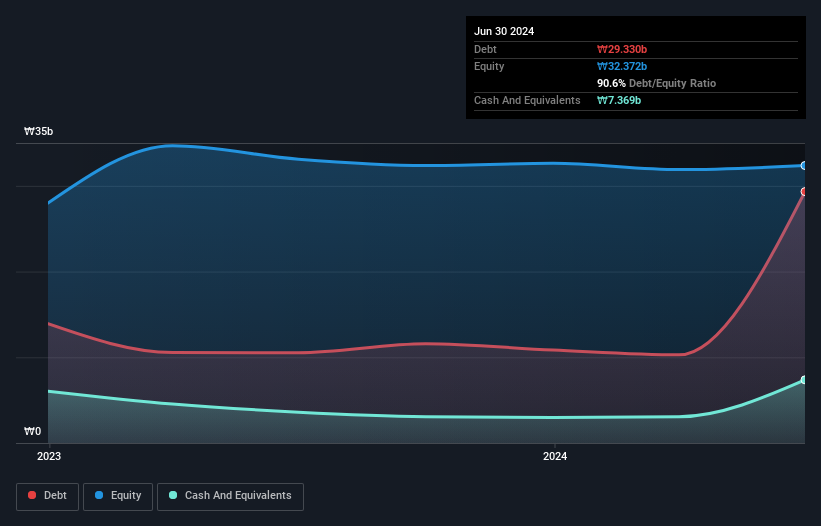Warren Buffett famously said, 'Volatility is far from synonymous with risk.' So it seems the smart money knows that debt - which is usually involved in bankruptcies - is a very important factor, when you assess how risky a company is. We can see that WISE iTech Co., Ltd. (KOSDAQ:065370) does use debt in its business. But should shareholders be worried about its use of debt?
When Is Debt A Problem?
Debt assists a business until the business has trouble paying it off, either with new capital or with free cash flow. Part and parcel of capitalism is the process of 'creative destruction' where failed businesses are mercilessly liquidated by their bankers. While that is not too common, we often do see indebted companies permanently diluting shareholders because lenders force them to raise capital at a distressed price. Having said that, the most common situation is where a company manages its debt reasonably well - and to its own advantage. When we examine debt levels, we first consider both cash and debt levels, together.
See our latest analysis for WISE iTech
How Much Debt Does WISE iTech Carry?
As you can see below, at the end of June 2024, WISE iTech had ₩29.3b of debt, up from ₩10.5b a year ago. Click the image for more detail. However, because it has a cash reserve of ₩7.37b, its net debt is less, at about ₩22.0b.

How Strong Is WISE iTech's Balance Sheet?
Zooming in on the latest balance sheet data, we can see that WISE iTech had liabilities of ₩16.1b due within 12 months and liabilities of ₩21.6b due beyond that. Offsetting this, it had ₩7.37b in cash and ₩2.38b in receivables that were due within 12 months. So its liabilities outweigh the sum of its cash and (near-term) receivables by ₩28.0b.
This deficit is considerable relative to its market capitalization of ₩36.7b, so it does suggest shareholders should keep an eye on WISE iTech's use of debt. This suggests shareholders would be heavily diluted if the company needed to shore up its balance sheet in a hurry. The balance sheet is clearly the area to focus on when you are analysing debt. But it is WISE iTech's earnings that will influence how the balance sheet holds up in the future. So if you're keen to discover more about its earnings, it might be worth checking out this graph of its long term earnings trend.
Over 12 months, WISE iTech made a loss at the EBIT level, and saw its revenue drop to ₩30b, which is a fall of 7.3%. That's not what we would hope to see.
Caveat Emptor
Importantly, WISE iTech had an earnings before interest and tax (EBIT) loss over the last year. Indeed, it lost ₩820m at the EBIT level. Considering that alongside the liabilities mentioned above does not give us much confidence that company should be using so much debt. So we think its balance sheet is a little strained, though not beyond repair. However, it doesn't help that it burned through ₩17b of cash over the last year. So in short it's a really risky stock. The balance sheet is clearly the area to focus on when you are analysing debt. However, not all investment risk resides within the balance sheet - far from it. We've identified 5 warning signs with WISE iTech (at least 2 which are significant) , and understanding them should be part of your investment process.
At the end of the day, it's often better to focus on companies that are free from net debt. You can access our special list of such companies (all with a track record of profit growth). It's free.
Valuation is complex, but we're here to simplify it.
Discover if WISE iTech might be undervalued or overvalued with our detailed analysis, featuring fair value estimates, potential risks, dividends, insider trades, and its financial condition.
Access Free AnalysisHave feedback on this article? Concerned about the content? Get in touch with us directly. Alternatively, email editorial-team (at) simplywallst.com.
This article by Simply Wall St is general in nature. We provide commentary based on historical data and analyst forecasts only using an unbiased methodology and our articles are not intended to be financial advice. It does not constitute a recommendation to buy or sell any stock, and does not take account of your objectives, or your financial situation. We aim to bring you long-term focused analysis driven by fundamental data. Note that our analysis may not factor in the latest price-sensitive company announcements or qualitative material. Simply Wall St has no position in any stocks mentioned.
About KOSDAQ:A065370
WISE iTech
Engages in the provision of artificial intelligence (AI), big data analysis, and data quality solutions primarily in South Korea.
Acceptable track record with mediocre balance sheet.
Market Insights
Community Narratives


Recently Updated Narratives

Astor Enerji will surge with a fair value of $140.43 in the next 3 years

Proximus: The State-Backed Backup Plan with 7% Gross Yield and 15% Currency Upside.


A case for for IMPACT Silver Corp (TSXV:IPT) to reach USD $4.52 (CAD $6.16) in 2026 (23 bagger in 1 year) and USD $5.76 (CAD $7.89) by 2030
Popular Narratives


MicroVision will explode future revenue by 380.37% with a vision towards success


The company that turned a verb into a global necessity and basically runs the modern internet, digital ads, smartphones, maps, and AI.



